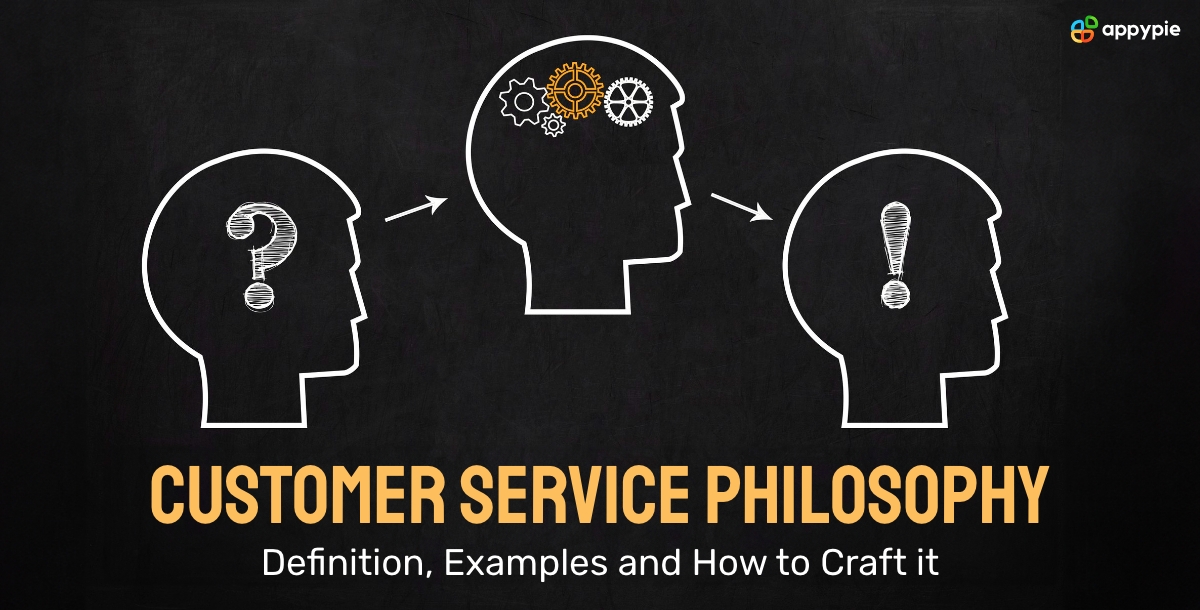Customer Service Philosophy: Definition, Examples and How to Craft it

A customer service philosophy isn't just a set of rules; it's the heartbeat of a brand's interaction with its customers. In today's fiercely competitive landscape, crafting a unique and resonant customer service philosophy is more than a necessity. It's a differentiator. This guide dives deep into the essence of creating a philosophy that not only aligns with your company's core values but also transforms every customer interaction into an opportunity to build lasting loyalty and trust. Join us as we explore the steps to crafting, implementing, and sustaining a customer service philosophy that truly stands out.
Defining Customer Service Philosophy
A customer service philosophy is like a guidebook that a company follows to make sure their customers are happy and keep coming back. It's all about what the company believes in, how it treats its customers, and the steps it takes to make sure customers are satisfied. Having a clear and strong customer service philosophy helps a company stand out and makes sure everyone on the team knows how to treat customers the right way.
Crafting Compelling Customer Service Philosophy Statements
Crafting a customer service philosophy statement is a thoughtful process that involves introspection about what your company stands for, how it wants to be perceived by customers, and the specific strategies it will employ to ensure customer satisfaction and loyalty. Here's a structured approach to writing an impactful customer service philosophy statement:
- Foster Collaborative Development: Encouraging input from various departments can enhance your approach to customer support. Help desk software that streamlines service tasks can provide significant insights for enhancing how services are delivered. Engaging team members from all sectors ensures that your customer service philosophy is comprehensive and embraced by everyone.
- Align With Core Values: Your approach to customer support should reflect your company's fundamental principles, making sure every interaction adds positively to your overall mission. This alignment is essential as it guides all efforts in customer service to achieve your company's main goals. For example, if your company values innovation, every customer interaction should showcase this by using the latest technology to improve service and engagement. Embracing the principle that "the customer is always right" can be a core value that guides the development and implementation of innovative customer service solutions, ensuring that customer feedback and satisfaction drive your company's advancements.
- Encourage Feedback and Open Dialogue: Building a culture that appreciates feedback from both customers and staff is crucial for crafting a customer service philosophy that resonates with everyone involved. By getting insights directly from customers through interactive methods, you gain a clear view of what aspects of your service excel and which areas require enhancement. This open communication ensures that your service strategies are flexible and align with customer needs and expectations, embodying the core values of your company and making every interaction a reflection of your commitment to excellence.
- Focus on Customer Centricity: The core of your philosophy should be a strong focus on the customer. This means not just meeting customer needs but anticipating them, thus improving accessibility and responsiveness. Using technology can greatly enhance the customer experience by ensuring that your company is always attentive and responsive to customer queries.
- Empower Your Team to Make Decisions: Allowing your team to make immediate decisions in favor of customer satisfaction not only speeds up the resolution process but also builds a sense of responsibility and ownership among team members. Using systems where customer service representatives can quickly address and solve issues reinforces this empowerment philosophy.
- Secure Organizational Commitment: For your philosophy to be truly effective, it must be supported by every level of your organization. Training sessions that highlight the advantages of instant messaging tools can encourage organizational support, ensuring your customer service philosophy is practiced in every customer interaction.
- Outline Specific Actions: Turning a philosophy into action means taking clear steps. For example, by setting up a system to track customer questions, we make sure every issue is sorted and solved quickly. This system, known as a ticketing systems, acts like a digital filing cabinet, organizing customer inquiries so nothing gets lost or overlooked. It not only streamlines our response process but also ensures that every customer receives timely and efficient help. This shows we're serious and gives our team straightforward guidance on what to do.
- Continually Evaluate and Adapt: Your customer service approach should evolve with your business and the technology it uses. Regular reviews, informed by the latest in automated customer assistance tools, ensure your strategy remains relevant and efficient, adapting to changing customer preferences and needs. Incorporating free chatbot AI into your customer service toolkit is a prime example of this adaptability, allowing for real-time customer feedback collection and analysis, which aids in the continual refinement of your service approach to meet and exceed customer expectations.
- Celebrate Customer Service Successes: Acknowledge and reward employees who demonstrate your customer service philosophy. This can be through formal recognition programs or informal praise in team meetings. Celebrating successes not only motivates employees but also reinforces the behaviors and attitudes you wish to see, helping to deeply integrate your customer service philosophy into your company culture.
- Demonstrate Leadership in Service: Leaders should exemplify the customer service philosophy, using a customer service chatbot to show innovation in customer service. This not only sets a high standard for the team but also demonstrates a commitment to leveraging technology for outstanding service. By integrating advanced customer service chatbots, leaders can provide real-time examples of how technology can enhance customer interactions, streamline service processes, and ensure that the company stays at the forefront of customer service innovation.
Inspiring Customer Service Philosophy Examples
Crafting a customer service philosophy that resonates with both employees and customers is crucial for any business aiming to stand out in today's competitive landscape. Here are examples of companies that have excelled in creating and implementing distinctive customer service philosophies:
Apple
Apple's approach to customer service is centered on the idea of enriching lives, aiming to seamlessly integrate their products and services into the daily routines of their customers. This philosophy is operationalized through innovative support solutions, including a customer experience chatbot, which assist in providing a streamlined customer journey. Apple focuses on solving customer issues with empathy and expertise, ensuring that technology is accessible and enhances the lives of users. By prioritizing customer experience through advanced chatbot solutions, Apple continues to set industry standards in customer satisfaction and technological integration.
Southwest Airlines
Southwest Airlines embodies a philosophy where customer service is more than a policy; it's a way of life. This ethos is built around the importance of human connection in every interaction, with a focus on being friendly, reliable, and affordable. Southwest empowers its employees to take personal initiative in ensuring passenger satisfaction, encouraging them to go beyond the standard procedures to make travel a positive experience for everyone. This approach has helped Southwest maintain a strong reputation for customer care in the airline industry, where the personal touch can make a significant difference in the travel experience.
Zappos
Zappos stands out for its unparalleled commitment to customer happiness, encapsulated in its philosophy to "Deliver WOW Through Service." This approach is brought to life through their exceptional policies, such as a 365-day return policy and round-the-clock customer support. Zappos uses live chat software to empower its customer service representatives, enabling them to forge personal connections with customers. This technology supports the delivery of personalized, efficient service, ensuring that every customer interaction is an opportunity to exceed expectations.
Nordstrom
Nordstrom's customer service philosophy is famously simple yet profoundly impactful: "Use good judgment in all situations." This guideline gives employees the autonomy to make decisions that they believe will best serve the customer, fostering an environment of trust and high personal accountability. Nordstrom's legendary commitment to customer satisfaction includes practices like accepting returns without receipts and offering personal shopping assistants, which have set a high bar in the retail industry for customer care. This philosophy not only empowers employees but also deeply ingrains the value of exceptional service in the company culture, making Nordstrom a benchmark for customer service excellence.
Amazon
Amazon's customer service philosophy is deeply rooted in customer obsession, a principle that prioritizes customer satisfaction over competitor focus. This philosophy is evident in their extensive use of a customer support chatbot, which ensures that help is readily available whenever customers need it. By integrating advanced AI and chatbot technologies, Amazon facilitates a seamless support experience, allowing for quick resolution of inquiries and issues. This unwavering commitment to customer needs and convenience is a cornerstone of Amazon's global success in the retail sector.
Practice Customer Service Philosophy
Implementing a customer service philosophy that truly resonates with your organization and its values is essential for fostering a culture of exceptional service. Here’s how you can bring this philosophy to life effectively:
- Technology Integration: Adopt technology solutions that enhance your customer service capabilities. A chatbot creator can be instrumental in developing customized chatbots that deliver personalized interactions, showcasing your dedication to innovative and responsive customer service. This step aligns technology with your service ethos, ensuring that every digital interaction reflects your commitment to customer satisfaction.
- Craft Customer Service Philosophy Resonates: The first step is to ensure that your customer service philosophy is well-defined and resonates with every member of your organization. This involves creating a set of principles that emphasize the importance of customer satisfaction and ensuring that these principles are communicated effectively to all employees, from the frontline staff to the executive team.
- Performance Metrics: Establish clear metrics to evaluate how well your customer service efforts reflect your philosophy. Use analytics tools to track customer satisfaction scores, response times, and resolution rates. This data is crucial for understanding the effectiveness of your customer service strategies and making necessary adjustments.
- Feedback Loops: It's important to have mechanisms in place for gathering customer feedback, such as surveys or direct feedback options within your service platform. This input is invaluable for gauging customer perceptions of your service and identifying areas for improvement.
- Training and Development: It's crucial to provide comprehensive training for all employees, ensuring they understand how to embody the customer service philosophy in every interaction. Utilizing customer experience chatbot simulations or other interactive training tools can offer hands-on experience in managing a variety of customer scenarios in a way that aligns with your company's values.
Sustaining Customer Service Philosophy
To ensure your customer service philosophy remains a living part of your organization, consider these ongoing practices:
- Regular Reviews and Adaptation: The landscape of customer expectations and market conditions is ever-changing, and your customer service philosophy needs to evolve accordingly. Utilize feedback and data analysis to stay in tune with shifting customer preferences, ensuring your philosophy remains both relevant and impactful.
- Celebrating Successes: Acknowledge and celebrate employees who bring your customer service philosophy to life, whether through exceptional problem-solving or enhancing customer interactions. Showcasing these achievements underscores the importance of your philosophy and motivates others to follow suit.
- Commitment to Continuous Improvement: Embrace a culture of ongoing enhancement, drawing on insights and advancements to refine your customer service approach. This could mean further training for your team, updating your technology, or tweaking your processes to ensure they're fully aligned with your service ethos.
- Engaging and Empowering Your Team: For a customer service philosophy to truly take root, your employees must feel both connected to it and empowered by it. Encourage open feedback and involve them in decision-making, ensuring they feel valued and invested in the service strategy you're collectively executing.
One Size Does Not Fit All in Customer Service Philosophy
A one-size-fits-all strategy in customer service philosophy is impractical. Each enterprise must sculpt a philosophy that mirrors its unique values, serves its specific customer demographic, and matches its product or service offerings. This customization could range from ensuring rapid response times to wholeheartedly embracing a customer-first mentality, where their needs and satisfaction guide every decision. Crafting a philosophy that not only harmonizes with the company’s ethos but also genuinely resonates with both customers and employees is crucial. It’s about forging a deep connection that transcends transactions, creating memorable experiences that build loyalty and trust. This tailored approach allows companies to stand out in a competitive landscape, turning customer service from a necessity into a defining feature of the brand. By doing so, businesses can cultivate a loyal customer base that feels valued and understood, which is essential in today’s market where customer expectations are higher than ever.
Conclusion
A well-crafted customer service philosophy is pivotal for any business aiming to thrive in today's competitive market. It's about more than just policies; it's about creating a culture that prioritizes customer satisfaction, fosters loyalty, and builds trust. By aligning this philosophy with your company's core values, encouraging open dialogue, and continuously adapting to meet customer needs, you can differentiate your brand and cultivate a loyal customer base. Remember, the key to success lies in not just establishing a customer service philosophy but living it in every interaction.
Related Articles
- Does Refusal Training in LLMs Generalize to the Past Tense?
- How to Promote Paid Mobile Apps?
- Appy Pie’s Ultimate Guide to Retargeting Ads
- 10+ Best Faceless YouTube Channel Ideas for 2024
- What is Motion in Graphic Design (Concepts and Examples)
- 7 Effective Ways to Automate Microsoft Excel in 2024
- 200+ Tasteful Food Business Name Ideas
- OmniGlue: A Generalizable Learnable Image Matcher Guided by Vision Foundation Models
- 21 Rules for Starting a Poultry Farm Business Plan
- 33 Best Design Books: Must-Read Recommendations

 Apple's approach to customer service is centered on the idea of enriching lives, aiming to seamlessly integrate their products and services into the daily routines of their customers. This philosophy is operationalized through innovative support solutions, including a
Apple's approach to customer service is centered on the idea of enriching lives, aiming to seamlessly integrate their products and services into the daily routines of their customers. This philosophy is operationalized through innovative support solutions, including a  Southwest Airlines embodies a philosophy where customer service is more than a policy; it's a way of life. This ethos is built around the importance of human connection in every interaction, with a focus on being friendly, reliable, and affordable. Southwest empowers its employees to take personal initiative in ensuring passenger satisfaction, encouraging them to go beyond the standard procedures to make travel a positive experience for everyone. This approach has helped Southwest maintain a strong reputation for customer care in the airline industry, where the personal touch can make a significant difference in the travel experience.
Southwest Airlines embodies a philosophy where customer service is more than a policy; it's a way of life. This ethos is built around the importance of human connection in every interaction, with a focus on being friendly, reliable, and affordable. Southwest empowers its employees to take personal initiative in ensuring passenger satisfaction, encouraging them to go beyond the standard procedures to make travel a positive experience for everyone. This approach has helped Southwest maintain a strong reputation for customer care in the airline industry, where the personal touch can make a significant difference in the travel experience. Zappos stands out for its unparalleled commitment to customer happiness, encapsulated in its philosophy to "Deliver WOW Through Service." This approach is brought to life through their exceptional policies, such as a 365-day return policy and round-the-clock customer support. Zappos uses
Zappos stands out for its unparalleled commitment to customer happiness, encapsulated in its philosophy to "Deliver WOW Through Service." This approach is brought to life through their exceptional policies, such as a 365-day return policy and round-the-clock customer support. Zappos uses  Nordstrom's customer service philosophy is famously simple yet profoundly impactful: "Use good judgment in all situations." This guideline gives employees the autonomy to make decisions that they believe will best serve the customer, fostering an environment of trust and high personal accountability. Nordstrom's legendary commitment to customer satisfaction includes practices like accepting returns without receipts and offering personal shopping assistants, which have set a high bar in the retail industry for customer care. This philosophy not only empowers employees but also deeply ingrains the value of exceptional service in the company culture, making Nordstrom a benchmark for customer service excellence.
Nordstrom's customer service philosophy is famously simple yet profoundly impactful: "Use good judgment in all situations." This guideline gives employees the autonomy to make decisions that they believe will best serve the customer, fostering an environment of trust and high personal accountability. Nordstrom's legendary commitment to customer satisfaction includes practices like accepting returns without receipts and offering personal shopping assistants, which have set a high bar in the retail industry for customer care. This philosophy not only empowers employees but also deeply ingrains the value of exceptional service in the company culture, making Nordstrom a benchmark for customer service excellence. Amazon's customer service philosophy is deeply rooted in customer obsession, a principle that prioritizes customer satisfaction over competitor focus. This philosophy is evident in their extensive use of a
Amazon's customer service philosophy is deeply rooted in customer obsession, a principle that prioritizes customer satisfaction over competitor focus. This philosophy is evident in their extensive use of a